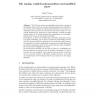Free Online Productivity Tools
i2Speak
i2Symbol
i2OCR
iTex2Img
iWeb2Print
iWeb2Shot
i2Type
iPdf2Split
iPdf2Merge
i2Bopomofo
i2Arabic
i2Style
i2Image
i2PDF
iLatex2Rtf
Sci2ools
116
click to vote
TACS
1994
Springer
1994
Springer
ML Typing, Explicit Polymorphism and Qualified Types
The ML type system was originally introduced as a means of identifying a class of terms in a simple untyped language, often referred to as core-ML, whose evaluation could be guaranteed not to "go wrong". In subsequent work, the terms of core-ML have also been viewed as a `convenient shorthand' for programs in typed languages. Notable examples include studies of ML polymorphism and investigations of overloading, motivated by the use of type classes in Haskell. In this paper, we show how qualified types, originally developed to study type class overloading, can be used to explore the relationship between core-ML programs and their translations in an explicitly typed language. Viewing these two distinct applications as instances of a single framework has obvious advantages; many of the results that have been established for one can also be applied to the other. We concentrate particularly on the issue of coherence, establishing sufficient conditions to guarantee that all po...
Related Content
| Added | 10 Aug 2010 |
| Updated | 10 Aug 2010 |
| Type | Conference |
| Year | 1994 |
| Where | TACS |
| Authors | Mark P. Jones |
Comments (0)

